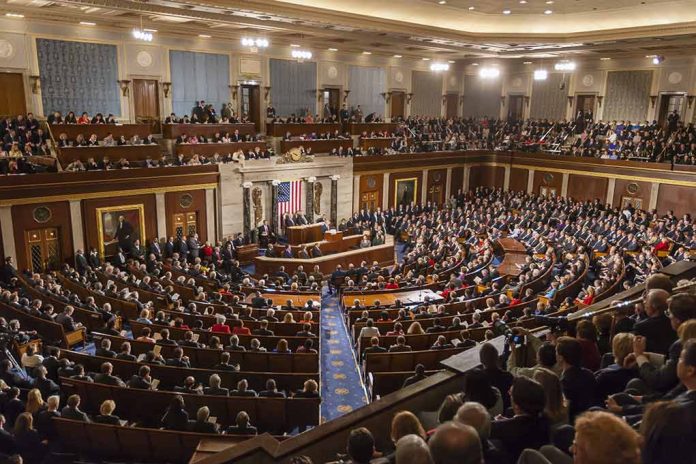
The U.S. House of Representatives passed a bill targeting forced organ harvesting with overwhelming bipartisan support, while lone dissenter Rep. Thomas Massie stood firm on his principles against foreign intervention.
Key Takeaways
- The Stop Forced Organ Harvesting Act passed the House with a near-unanimous vote of 406-1, with Kentucky Republican Thomas Massie being the only dissenting vote.
- The bill authorizes sanctions and U.S. passport/visa restrictions on individuals and entities involved in organ trafficking, particularly targeting practices in China.
- Rep. Chris Smith (R-NJ), who introduced the bill, cited testimonies about crimes against Uyghurs, Falun Gong practitioners, and other minority groups in China as motivation.
- Massie opposed the legislation on libertarian grounds, arguing it constitutes American overreach into another country’s affairs.
- This marks the second time the bill has passed the House after a 413-2 vote in 2023, though it was not taken up by the Senate last year.
Overwhelming Bipartisan Support for Anti-Organ Harvesting Legislation
In a rare display of congressional unity, the U.S. House of Representatives overwhelmingly passed the Stop Forced Organ Harvesting Act with a vote of 406-1. The bill, introduced by Rep. Chris Smith (R-NJ), aims to combat what lawmakers describe as state-sponsored organ harvesting practices by the Chinese Communist Party. The legislation authorizes the Secretary of State to deny U.S. passports and visas to individuals involved in organ trafficking and proposes sanctions on entities participating in such activities.
This marks the second time the House has approved such legislation. A similar bill passed in 2023 with a vote of 413-2 but failed to advance in the Senate. The renewed push highlights continued concerns about human rights abuses in China, particularly against religious and ethnic minorities. Smith’s bill specifically targets practices that allegedly target Falun Gong practitioners, Uyghur Muslims, and other groups persecuted by the Chinese government.
The @UyghurProject attended a press conference w/ 🇺🇸 Rep. Chris Smith on H.R.1503 (Stop Forced Organ Harvesting Act), which passed the House yesterday.
The bill directs the U.S. to combat int'l organ trafficking + impose sanctions on perpetrators.@Uyghur_American @CUyghurs pic.twitter.com/B8svaU5I0L
— Uyghur Human Rights Project (@UyghurProject) May 8, 2025
Massie Stands Alone on Principles
Representative Thomas Massie (R-KY) stood as the sole dissenter against the bill, drawing attention for his isolated stance. Explaining his position, Massie maintained that his vote aligned with his consistent libertarian principles against U.S. intervention in foreign nations’ affairs. The Kentucky Republican has previously taken similar positions on international legislation, often finding himself voting against measures that enjoy broad support from both parties. “It’s just another example of us trying to stick our nose in another country’s business and write their laws, And at the end of the day, they’re gonna do what they’re gonna do, and it’s just sort of a virtue signal over here,” remarked Massie.
Massie characterized the legislation as “virtue signaling” that attempts to dictate how foreign governments should operate. His position highlights a tension within conservative politics between advancing human rights abroad and respecting national sovereignty. While many conservatives support strong measures against the Chinese Communist Party, Massie’s stance reflects a non-interventionist approach that prioritizes limiting American overreach in international affairs.
Smith Champions Human Rights Response to China’s Alleged Abuses
Representative Chris Smith, who has long advocated for human rights causes, framed the bill as a necessary response to systematic abuses by the Chinese government. The New Jersey Republican has been vocal about what he describes as an industrial-scale operation of forced organ harvesting from political prisoners and persecuted groups in China. Smith’s legislation aims to create concrete consequences for those participating in such practices.
Smith emphasized that the alleged organ harvesting continues unabated and called for decisive action from the United States and other democracies. The bill represents one of several China-focused measures the House considered this session, reflecting growing bipartisan concern about Chinese government policies. If enacted, the legislation would establish reporting requirements on forced organ harvesting and create a coordinated response across multiple U.S. government agencies.
Sources:
Lone Republican becomes only lawmaker to vote against crackdown on human organ trafficking
Smith anti-organ harvesting bill passes House once again







